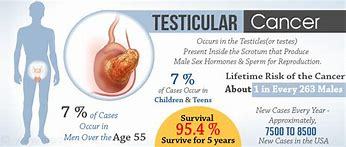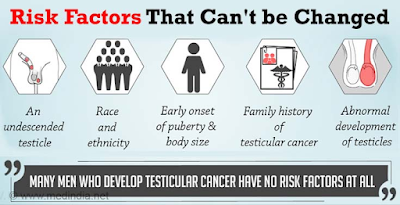Testicular Cancer: Complete Guide to all Your Queries From Our Expert : Dr Rohan Patel

Testicular cancer is a relatively rare form of cancer that affects the testicles, which are part of the male reproductive system. It primarily affects young and middle-aged men, usually between the ages of 15 and 35. At Ananta Urology and Robotics Clinic, Dr Rohan Patel, Uro Oncologist and Robotic Surgeon in Ahmedabad specializes in the diagnosis, treatment, and management of testicular cancer. Our team of experienced urologists and uro-oncologists is dedicated to providing advanced and comprehensive care to our patients.
What is Testicular Cancer?
Testicular cancer occurs when abnormal cells in the testicles begin to grow uncontrollably, forming a tumor. These tumors can be either benign (noncancerous) or malignant (cancerous). Most testicular tumors are cancerous and can spread to other parts of the body if left untreated.
Causes and Risk Factors
The exact cause of testicular cancer is unknown, but certain factors may increase the risk of developing the disease. These factors include :
1. Undescended Testicle - Men born with undescended testicles have a higher risk of testicular cancer. The risk remains even after corrective surgery.
2.Family History - Having a close relative, such as a father or brother with testicular cancer, increases the risk of developing the disease.
3.Age - Testicular cancer is most common in younger men, particularly between the ages of 15 and 35. However, it can occur at any age.
4.Age - Testicular cancer is more commonly diagnosed in white men compared to men of other ethnic backgrounds.

Symptoms of Testicular Cancer
Early detection is crucial for successful treatment of testicular cancer. It is important to be aware of the common signs and symptoms, which may include :
Lump or swelling - A painless lump or swelling in either testicle is the most common sign of testicular cancer. It may feel small and hard, or large and soft.
Testicular pain or discomfort - Some men may experience pain, discomfort, or a dull ache in the testicles or scrotum.
Changes in testicle shape or size - The affected testicle may appear larger, smaller, or feel differently than the other testicle.
Heaviness or lumps in the scrotum - Some men may experience a sensation of heaviness in the scrotum or notice lumps or swelling in the scrotal area.
Pain or discomfort in the lower abdomen or groin - Testicular cancer can cause pain or a pulling sensation in the lower abdomen or groin area.
It is important to note that these symptoms can also be caused by other conditions or infections. However, if you experience any of these symptoms, it is crucial to consult a urologist for proper evaluation and diagnosis.
Diagnosis
If testicular cancer is suspected, your urologist will perform a thorough physical examination and recommend further diagnostic tests, which may include :
Ultrasound - This imaging test uses sound waves to create detailed images of the testicles and help determine the presence and nature of any abnormalities.
Blood tests - Blood tests such as tumor marker tests, including alpha-fetoprotein (AFP), human chorionic gonadotropin (HCG), and lactate dehydrogenase (LDH), are used to detect certain proteins that may be elevated in cases of testicular cancer, which have prognostic value.
Treatment Options
Once a diagnosis of testicular cancer is confirmed, the treatment approach will depend on the stage and type of cancer. The main treatment options for testicular cancer include :
Surgery - The primary treatment for testicular cancer is usually the surgical removal of the affected testicle, a procedure known as radical inguinal orchiectomy. In some cases, a retroperitoneal lymph node dissection (RPLND) may be performed to remove nearby lymph nodes.
Radiation therapy - This treatment involves the use of high-energy radiation beams to kill cancer cells. It is used following surgery to eliminate any remaining cancer cells in the retroperitoneum.
Chemotherapy - This treatment uses medication to kill cancer cells. Chemotherapy may be administered after surgery to eliminate any remaining cancer cells.
It's important to note that the treatment plan will be tailored to each individual patient based on the specific characteristics of their cancer, overall health, and personal preferences. Your urologist and healthcare team will discuss the most appropriate treatment options for you, taking into consideration the stage, type, and potential side effects of each treatment.
Living with Testicular Cancer
Receiving a diagnosis of testicular cancer can be overwhelming, and it's natural to have concerns and questions. Here are a few tips for living with testicular cancer :
Educate yourself - Learn about testicular cancer, its treatment options, and potential side effects. Understanding your diagnosis and treatment plan can help you feel more empowered and confident in making decisions about your care.
Seek support - Reach out to friends, family, and support groups to share your concerns and experiences. Connecting with others who have gone through similar situations can provide emotional support and valuable insights.
Take care of your overall health - Adopt a healthy lifestyle by eating a well -balanced diet, engaging in regular exercise, and practicing stress management techniques. Taking care of your physical and mental well-being can help support your overall recovery and improve quality of life.
Follow your follow-up care plan - Regular follow-up visits with your healthcare team are important to monitor your progress, detect any signs of recurrence, and address any ongoing concerns or side effects of treatment. Make sure to attend all scheduled appointments and communicate any changes or symptoms you may be experiencing.
Consider fertility preservation - Some treatments for testicular cancer, such as chemotherapy or radiation therapy, can impact fertility. If you have concerns about future fertility, discuss options for fertility preservation with your healthcare team before starting treatment.
Remember, each person's journey with testicular cancer is unique, and it's important to take the time to care for yourself physically, emotionally, and mentally. Surround yourself with a strong support network, stay informed about your treatment options, and trust in the expertise of your healthcare team.
If you have any further questions or concerns about testicular cancer or its treatments, please reach out to our team at Ananta Urology and Robotics Clinic. We are here to provide comprehensive care and support throughout your journey.
FAQs about Testicular Cancer :
At Ananta Urology and Robotics Clinic in Ahmedabad , we offer comprehensive treatment for testicular cancer. Our highly skilled team of urologists and oncologists specializes in the diagnosis, treatment, and management of testicular cancer. We utilize the latest advancements in robotic surgery, radiation therapy, and chemotherapy to provide personalized and effective treatment options for our patients.
If you have any concerns or suspect that you may have testicular cancer, it is important to consult with a healthcare professional. Early detection and prompt treatment can significantly improve outcomes and quality of life.
For more information or to schedule a consultation, please visit our website www.anantaurologyandroboticsclinic.com or contact us directly. Our team is dedicated to providing compassionate and expert care to help you navigate through your testicular cancer journey.
Remember, staying informed and proactive about your health is crucial. Don't hesitate to seek medical advice and support when needed. Together, we can fight against testicular cancer and improve outcomes for all.

